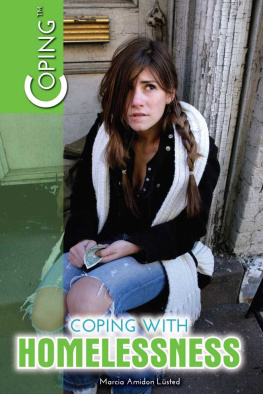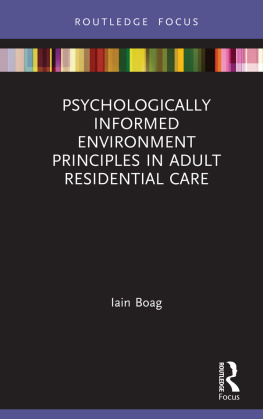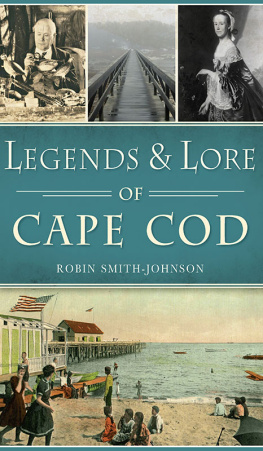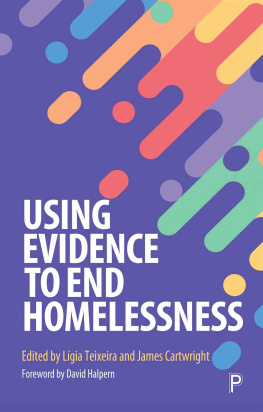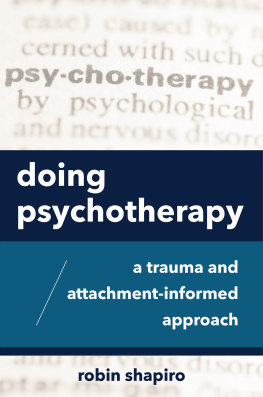Praise for Cross-Cultural Dialogues on Homelessness
Jay Levy and colleagues Cross-Cultural Dialogues on Homelessness: From Pretreatment Strategies to Psychologically Informed Environments provides wonderful insight into the profound relationship-building that is the core of street outreach to the unsheltered homeless. Jay distills many decades of his own street experience, and by cross comparing his brilliant schema of Pretreatment with the British model of Psychologically Informed Environments (PIE), he reveals the underlying common processes of effective street engagement. Essentially, Jay shows us how to compassionately embrace the reality of those who fall within the underwater portion of the pre-contemplative iceberg of behavioral change. As a long-time practitioner of street medicine, I recommend this book to anyone who seeks that sacred place on the streets where healing begins.
Jim Withers, MD, Founder and Medical Director Operation Safety Net and the Street Medicine Institute (Pittsburgh, PA)
In Cross-Cultural Dialogues on Homelessness, Jay Levy and co-authors provide the conceptual tools, the hitherto missing language, needed by practitioners and policy makers working with excluded individuals. This well-written and insightful book outlines the psychologically informed approach that has been successfully used in the US, UK and other countries to re-integrate people who have experienced homelessness, severe mental illness and, frequently, other traumatic life events. It offers a common language, and, more importantly, a common vision of working across professional boundaries to redress social exclusion. This book has been informed by the authors practice and should come with a warning: it will revolutionise how you work - irreversibly and, undoubtedly, for the better.
Clona N Cheallaigh, MB, MRCP, PhD
Senior Lecturer in Medical Gerontology, Trinity College
(Dublin, Ireland)
I cheer the approach, which sees homeless people as survivors of complex, ongoing trauma rather than any of the many stigmatizing descriptions thrown at them. The philosophy and approach described here can, and indeed should, be applied to all client populations, not only to homeless people with long histories of trauma and its effects. As well as the theory, and descriptions of practice, the book is full of case studies that illuminate and inspire.
Bob Rich, PhD,
(Wombat Hollow, Australia)
At Anna Maria College, we have always felt fortunate to have had Jay Levy teach principles of outreach counseling to our student body. Now, through Cross-Cultural Dialogues on Homelessness, readers will get the opportunity to learn from Jays experiencesas well as his collaborators experiencesin working with people on the homelessness spectrum. For those of us who are new to the topic of homelessness, the text offers a valuable overview of theory, postmodernism, systems, application, and practice. For those of us who are deeply entrenched in the topic of homelessness, this book simultaneously offers refreshing, new insights. The text presents an ongoing conversation on homelessness that expands beyond the silos of professionals working (hard) in isolation of each other. It provides an international discourse and techniques to professionals; it provides resources to the people who need them and the hope for a better future.
John M. Pratico, MA, CAGS, PsyD
Director of Psychology Programs
Anna Maria College (Paxton, Massachusetts)
Cross Cultural Dialogues on Homelessness is a timely and important collection of the latest thinking on how we should respond to the traumatic life experiences of so many homeless people. Fascinatingly, the contributors show that therapists, counsellors and key workers on both sides of the Atlantic are reaching similar conclusions on the best way for services to think about their work with traumatised, excluded clients. Maybe it turns out we are all human? An implicit and passionate call for constructive dialogue at every level, the book shows how progress always depends on the development of shared languages, trust and communication. Levy and company suggest a commitment to reflective dialogue will improve both the quality of frontline services and the way policy makers, managers and commissioners think about responding to the needs of people pushed to the margins of our societies.
Alex Bax, Chief Executive, Pathway (London, UK)
BA, MA, MFPH, & Visiting Fellow, IHHD, University of East London
The title of this book caught my eye and Loving Healing Press, in small print, struck a chord. I read it carefully through a variety of lenses, mindful of the fact that a lot of time has passed since I started working with people labelled homeless. The dialogue taking place then had elements of what this book promotes. I lived and worked in a shelter with very damaged people interspersed with people from various backgrounds and experiences. We were inspired, challenged and supported by a psychologist and psychiatric nurse. Later, my research involved working with recently qualified doctors, including one who later trained as a psychiatrist and psychotherapist.
The questioning of the medical model was at the top of our agenda; lively discussions took place. Later, when TRUST, now the Alice Leahy Trust, was set up (1975), we always involved people who were in their own care. We met people where they were - mentally and physically. We were the first doctor and nurse team in Ireland visiting people sleeping rough. Our work was greatly supported, up to the time of his death, by Professor James McCormick, a GP and first head of the Department of Community Health at Trinity College, Dublin.
This book is different because it is based on theory and practises, dialogue and the sharing of ideas - from both sides of the Atlantic. The human interest stories add great value to the book, which should be required reading for anyone interested in creating a better world for his/her fellow human beings. It should be read and debated by all with a vision for a better future for those who need services and those attempting to provide them. People with the responsibility of planning services with no on the ground experience would benefit greatly from this book.
Alice Leahy, Director of Services,
Alice Leahy Trust (Dublin, Ireland)
Cross-Cultural Dialogues on Homelessness: From Pretreatment Strategies to Psychologically Informed Environments.
Edited by Jay S. Levy with Robin Johnson
Copyright 2017 by Jay S. Levy and Robin Johnson. All Rights Reserved.
ISBN 978-1-61599-366-6 Paperback
ISBN 978-1-61599-367-3 Hardcover
ISBN 978-1-61599-368-0 eBook
Loving Healing Press
5145 Pontiac Trail www.LHPress.com
Ann Arbor, MI 48105
Toll free: 888-761-6268 (USA/CAN) FAX: 734-663-6861
Distributed by Ingram Book Group (USA/CAN/AU), Bertrams Books (UK/EU).
Library of Congress Cataloging-in-Publication Data
Names: Levy, Jay S., 1961- editor. | Johnson, Robin Giles Hillary, 1948-editor.
Title: Cross-cultural dialogues on homelessness: from pretreatment strategies to psychologically informed environments/edited by Jay S. Levy with Robin Johnson.
Description: 1st Edition. | Ann Arbor, MI: Loving Healing Press, [2018] | Includes index.
Identifiers: LCCN 2017043564 (print) | LCCN 2017052186 (ebook) | ISBN 9781615993680 (ePub, PDF, Kindle) | ISBN 9781615993666 (pbk.: alk. paper) | ISBN 9781615993673 (hardcover: alk. paper)


